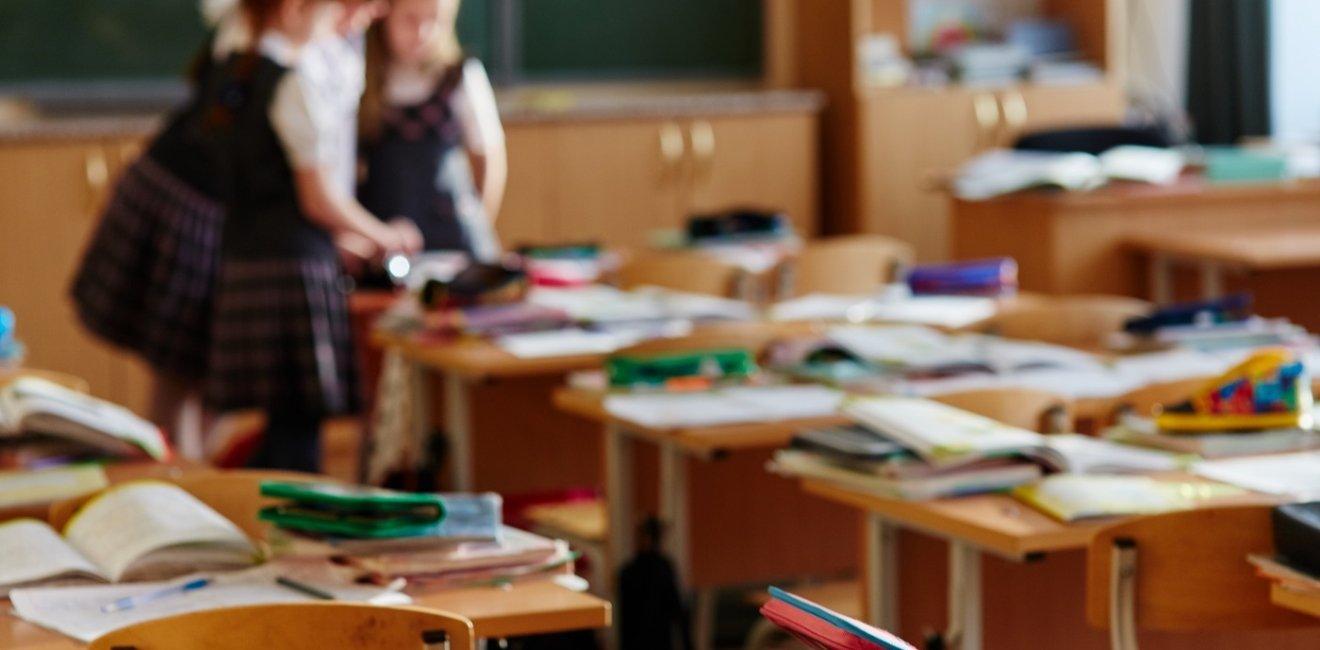
A blog of the Kennan Institute
On September 1, known in Russia as the Day of Knowledge, 18 million students took their seats in Russian classrooms, and—for the second year, already—they did so in a country fundamentally changed by its own aggressive war. Schools could not remain unaffected by the changes in the Russian state and society. In fact, classrooms are turning into an ideological battleground.
After all, younger people growing up in the internet era are less susceptible to television propaganda than their parents and grandparents, so a different approach is required to indoctrinate them.
What the State Deems Important
Starting in September 2022, schools across Russia begin every week with a flag-raising ceremony followed by a lesson entitled “Conversations about Important Things.” Vladimir Putin personally kick-started the first Important Conversations series last year by giving an “open lesson” to a select group of students and telling them that Russia’s mission in Ukraine was to “stop the war” and “protect the people” in the Donbas. During this year’s televised “open lesson” Putin told his young audience that Russians were “invincible.”
Researcher Ivan Fomin has identified a strong anti-Western slant in how the teaching guidelines for Important Conversations cover certain topics, along with the message that “the state is the most authoritative source of information” about everything. Teachers are meant to put forward the idea of national unity and patriotism, emphasize heroism and self-sacrifice, and promote “traditional values.” In 2022, one of the conversations focused on the annexation of Crimea, or, as the official narrative refers to it, “the reunification of Crimea with Russia.”
Last year, the Soft Power women’s movement and the Alliance of Teachers union issued an open letter calling on parents to boycott the Important Conversations, which are technically an extracurricular activity, and on teachers to either refuse to teach this class or to educate students about the difference between “patriotism and aggressive militarism.” Some parents do indeed find ways for their children to skip the lessons. And some educators sabotage them, by, for instance, picking neutral topics for discussion.
Resistance is not a risk-free option though. In the city of Perm, school principal Elena Rakintseva was forced to resign after refusing to host meetings with Ukraine war veterans. And Sergei Chernyshov, founder of a private vocational school in Novosibirsk, was labeled a “foreign agent” for refusing to hold Important Conversations or expel his students for anti-war protests. This status means he is no longer allowed to work in education.
New Curriculum for a New Reality
Public debate was sparked ahead of the academic year by a new Russian history textbook for the 11th grade, the final year of high school. Co-authored by presidential aide Vladimir Medinsky and MGIMO rector Anatoly Torkunov, it reframes Soviet and Russian history from 1970s onwards in accordance with today’s political agenda, and there is a separate chapter on the so-called “special military operation,” which demonizes the West and presents Russia’s aggression against Ukraine as justified. Commentators criticize the new textbook for the chaotic presentation and tendentious interpretation of recent history and current events. Historian Nikita Sokolov called it an “outrageously bloated propaganda leaflet.” Unmoved by the public outcry, Education Minister Sergei Kravtsov promised that fifth to ninth graders will get their own new history textbooks next year.
Another shadow was cast on the Day of Knowledge by the newly publicized demo versions of next year’s Unified State Exam (USE), which serves as both final school and university entrance exam. The 2024 Russian literature USE brings back two novels beloved by the Soviet propaganda machine: Alexander Fadeyev’s The Young Guard and Nikolai Ostrovsky’s How the Steel Was Tempered. The topics of “Democracy,” “Civic Society and the State,” “International Law,” and “Alternative Civilian Service” were all dropped from the list of themes for the 2024 exam in social studies. And the demo version of the history exam has questions referencing the war in Ukraine. If this trend persists and graduates are forced to answer questions about Russian aggression in a test, on which their college prospects depend, exams will turn into a test of integrity.
In the meantime, recently adopted amendments allow young men to sign up for military service at the age of 18, straight out of high school. Combined with creeping militarization of schools—dressing kids in Soviet military uniforms, installing “hero desks” with faces of Russia’s war dead, introducing basic military training for high schoolers, and emphasizing self-sacrifice for the homeland—this initiative inspires the uncomfortable feeling that Russia is raising its new generation for slaughter, not for college.
Lessons Learned
According to political scientist Ekaterina Schulmann, the Russian regime’s attempts to indoctrinate school students may signal a transformation into a more totalitarian political model, and the main form of resistance is “quiet sabotage.” Unfortunately, the space for maneuver is shrinking, and teachers and parents cannot always find allies in one another. Soviet-style denunciations have flourished against the backdrop of the war in Ukraine. A classroom can be an especially dangerous place: sometimes students and their hypervigilant parents tell on teachers, and sometimes educators report their students to the authorities. Possible repercussions go beyond dismissals and expulsions, as antiwar views may, and do often, land people in jail.
Optimists recall their own school years—how little trust they placed in teachers, and how little they remember from textbooks and lessons—and dismiss the regime’s efforts to impose its agenda on the youngest citizens as doomed to fail. Others worry that the main takeaways from the new curriculum will be obedience and hypocrisy. Liberal-minded teachers must now tread carefully, and liberal-minded parents are forced to warn their kids that they must silently endure the newly introduced lessons and school rituals and that certain thoughts can only be shared in the safety of their homes.
This situation invokes a rather familiar image of Soviet society, where sincerity was reserved for private conversations around a kitchen table. Millennials were probably the first generation to know about the Soviet culture of forced duplicity and instinctive hypocrisy only from books and films, and to get out of learning these skills at school. It is disheartening to see that lesson re-introduced into the Russian school curriculum.
One question remains: why talk explicitly about the war against Ukraine in the classroom? Why not focus on the general narrative of Russia’s greatness, the malevolent West, the importance of self-sacrifice, and traditional values, while setting current, potentially polarizing, events aside? A possible, very disturbing, explanation is that by weaving the war into all facets of school education, from lessons to exams to extracurricular activities, the regime—in addition to indoctrinating children—aims to implicate every teacher, parent, and student in its crimes.
The opinions expressed in this article are those solely of the author and do not reflect the views of the Kennan Institute.
Author


Kennan Institute
The Kennan Institute is the premier US center for advanced research on Eurasia and the oldest and largest regional program at the Woodrow Wilson International Center for Scholars. The Kennan Institute is committed to improving American understanding of Russia, Ukraine, Central Asia, the South Caucasus, and the surrounding region through research and exchange. Read more

Explore More in The Russia File
Browse The Russia File
Chechnya as a Model of Modern Russia

Russia’s Indigenous Communities and the War in Ukraine

Gas and Power in a Changing US–Russia Relationship

